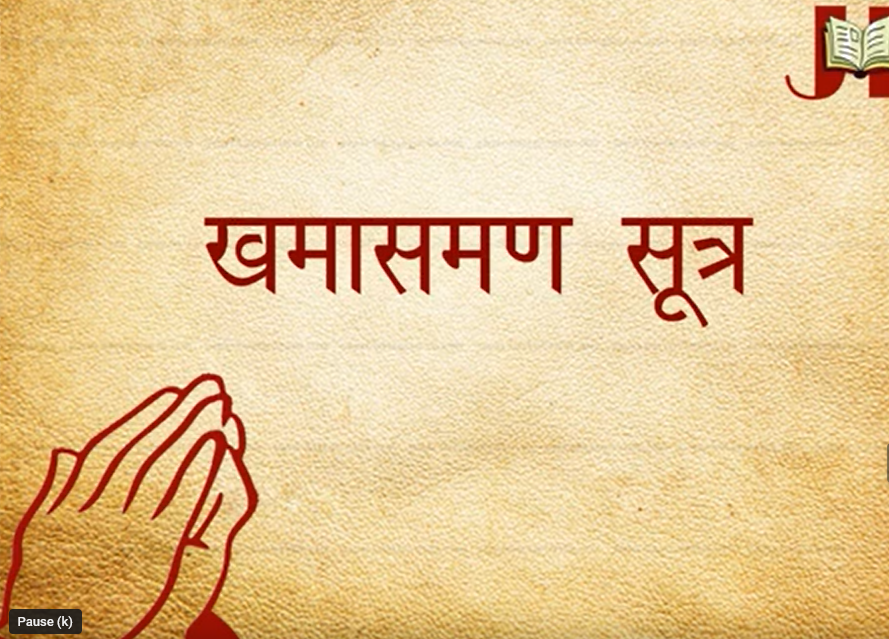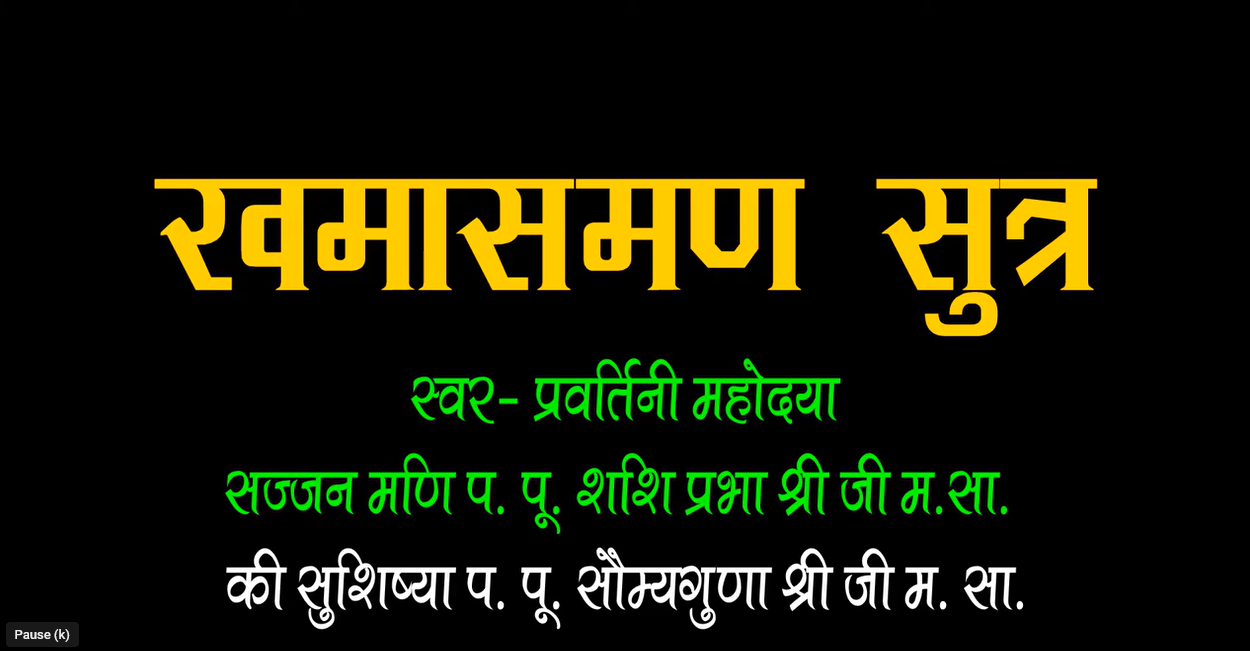Hindi
|| उवसग्गहरं सूत्र || | अर्थ |
उवसग्गहरं पासं, पासं वंदामि कम्मघण-मुक्कं | अर्थ: प्रगाढ कर्म समूह से सर्वथा मुक्त, विषधरो के विष को नाश करने वाले, मंगल और कल्याण के आवास तथा उपसर्गों को हरने वाले भगवन पार्श्वनाथ के में वंदना करता हूँ । |
English
|| UVASAGGAHARAM SUTRA|| | Meaning |
UVASAGGAHARAM PASAM, | I bow to Lord Parshwanath, who is attended by the distress removing Parshwa deity, who is free from all types of Karma, who is the destroyer of the poisonous defilements and who is the abode of bliss and well being. |
Gujrati
|| ઉવસગ્ગહરં સૂત્ર || | ગથાર્થ |
ઉવસગ્ગહરં પાસં, પાસં વંદામિ કમ્મ-ઘણ મુક્ક । વિસહર વિસ નિન્નાસં, મંગલ કલ્લાણ આવાસં ।।૧।। | ઉપસર્ગો(વિઘ્નો) ને નિવારનારા, પાર્શ્વયક્ષ જેમની નિકટ છે એવા અથવા ભક્તોની સમિપ રહેનાર(ઘાતિ) કર્મના સમુદાયથી મુક્ત, સર્પવિષનાશક, મંગળ અને કલ્યાણના ધામરૂપ એવા શ્રી પાર્શ્વપ્રભુને હું વંદન કરું છું. વિસહર સ્કુલિંગ નામના મંત્રને જે મનુષ્ય સદા કંઠે ધારણ કરે(નિરંતર જાપ કરે) તેનાં વિપરિત ગ્રહો, રોગો, મરકી, ભયંકર તાવ ખાદિ શાંત થઈ જાય છે. એ મંત્ર તો દુર રહો, પણ અમને કરવામાં આવેલ પ્રણામ પણ ધણા ફળને આપનારો છે. જેથી મનુષ્ય અને તિર્યંચ ગતિના જીવો પણ દુ:ખ |
खमासमण सूत्र
इच्छामि खमा-समणो! वंदिउं, जावणिज्जाए
निसीहिआंए, मत्थएण वंदामि ......१
गाथार्थ - खमासमण सूत्र
हे क्षमावान साधु महाराज! आपको मैं शक्ति के अनुसार पापमय प्रवृत्तियोें को त्याग कर
वंदन करना चाहता हूं. मैं मस्तक (आदि पांच अंगो) से वंदन करता हुं......१
ज्ञान के पांच खमासमण
मति ज्ञान:- समकित श्रध्धावंतने उपन्यो ज्ञान प्रकाश प्रणमुं पदकज तेहना भाव धरी उल्लास
“ॐ ह्रीं श्री मतिज्ञानाय नमो नमः”
ईच्छामि खमासमणो, वंदिउं जावणीज्जाए निसिहिआए मत्थएण वंदामि |श्रुत ज्ञान :- पवयण श्रुत सिद्धांत ते आगम समय वखाण पूजो बहुविध रागथी, चरण कमल चित आण
“ૐ ૐ श्री श्रुतनयनाय नमो नम:”
ईच्छामि खमासमणो, वंदिउं जावणीज्जाए निसिहिआए मत्थएण वंदामि |अवधि ज्ञान :- उपन्यो अवधिज्ञान नो, गुण जेहने अविकार वंदना तेहने मारी, श्वासे मांहे सो वार।
“ॐ ह्रीं श्री अवधिज्ञानाय नमो नमः”
ईच्छामि खमासमणो, वंदिउं जावणीज्जाए निसिहिआए मत्थएण वंदामि।- मनः पर्यव ज्ञान :- ए गुण जेहने उपन्यो, सर्वविरति गुणठाण प्रणमुं हितथी तेहना, चरण करण चित्त आण
“ॐ ह्रीं श्री मनः पर्यवज्ञानाय नमो नमः”
ईच्छामि खमासमणो, वंदिउं जावणीज्जाए निसिहिआए मत्थएण वंदामि | - केवल ज्ञान :- केवल दंसण नाणनो, चिदानंद धनतेज ज्ञानपंचमी दिन पूजिये, विजयलक्ष्मी शुभ हेज
“ॐ ह्रीं श्री केवलज्ञानाय नमो नमः”
ईच्छामि खमासमणो, वंदिउं जावणीज्जाए निसिहिआए मत्थएण वंदामि |
ખમાસણા સૂત્ર
ઇચ્છામિ ખમાસમણો, વંદિઉં જાવણીજ્જાએ
નિસિહિઆએ મર્ત્યએણ વંદામિ.
ગથાર્થ - ખમાસણા સૂત્ર
હે ક્ષમાશીલ ઋષિ મહારાજ ! હું તમને તમારી શક્તિ પ્રમાણે તમારી પાપી વૃત્તિઓ છોડી દઈશ.
મારે પૂજા કરવી છે. હું મારા માથા (અને શરીરના અન્ય પાંચ અંગો) વડે પૂજા કરું છું...1
જ્ઞાન ના પાંચ ખમાસણા
- મતિ જ્ઞાન :- સમકિત શ્રધ્ધાવંતને ઉપન્યો જ્ઞાન પ્રકાશ પ્રણમું પકજ તેહના ભાવ ધરી ઉલ્લાસ
“ૐ હ્રીં શ્રી મતિજ્ઞાનાય નમો નમઃ”
ઇચ્છામિ ખમાસમણો, વંદિઉં જાવણીજ્જાએ નિસિહિઆએ મર્ત્યએણ વંદામિ. - શ્રુત જ્ઞાન :- પવયણ શ્રુત સિદ્ધાંત તે આગમ સમય વખાણ પૂજો બહુવિધ રાગથી, ચરણ કમલ ચિત આણ
“ૐ હીં શ્રી શ્રુતજ્ઞાનાય નમો નમઃ”
ઇચ્છામિ ખમાસમણો, વંદિઉં જાવણીજ્જાએ નિસિહિઆએ મર્ત્યએણ વંદામિ. - અવધિ જ્ઞાન :- ઉપન્યો અવધિજ્ઞાન નો, ગુણ જેને અવિકાર વંદના તેહને મારી, શ્વાસે માંહે સો વાર
“ૐ હીં શ્રી અવધિજ્ઞાનાય નમો નમઃ”
ઈચ્છામિ ખમાસમણો, વંદિઉં જાવણીજ્જાએ નિસિહિઆએ મત્થએણ વંદામિ. - ન:પર્યવ જ્ઞાન :- એ ગુણ જેને ઉપન્યો, સર્વવિરતિ ગુણઠાણ પ્રણમું હિતથી તેહના, ચરણ કરણ ચિત્ત આણ
“ૐ હીં શ્રી મનઃ પર્યવજ્ઞાનાય નમો નમઃ”
ઈચ્છામિ ખમાસમણો, વંદિઉં જાવણીજ્જાએ નિસિહિઆએ મત્થએણ વંદામિ. - કેવળ જ્ઞાન :- કેવલ હંસણ નાણનો, ચિદાનંદ ધનતેજ જ્ઞાનપંચમી દિન પૂયેિ, વિજયલક્ષ્મી શુભ હેજ
“ૐ હીં શ્રી કેવલજ્ઞાનાય નમો નમઃ”
ઇચ્છામિ ખમાસમણો, વંદિઉં જાવણીજ્જાએ નિસિહિઆએ મત્થએણ વંદામિ.
KHAMASAMANA SUTRA
icchämi khamä-samano ! vandium,
jävanijjäe nisihiäe, matthaena vandämi.1.
MEANING - KHAMASAMANA SUTRA
This Sutra is also known as Panchäng Pranipät Sutra.
Different sects recite different sutras when one bows to the Tirthankar image or an Ascetic.
This Sutra is recited while offering obeisance to Tirthankar image at the temple
or to the monks and nuns in a specific posture wherein the five body parts, namely two hands,
two knees and the forehead, touch the floor together. Hence it is known as Panchäng Pranipät Sutra.
This sutra is recited three times in front of a Tirthankar image at the temple
or two times in front of an ascetic at an Upäshray (temporary living place for monks)
Utility :- By this sootra salutation are made to the Deva and Guru. Deva means Jineshwara Bhagwana and Guru means Jaina monks who never keep any money any woman with them . Three Khamasamanas are offered to the Deva and two Khamasamanas are offered to the Guru Maharaja. Obeisance is done by bowing the five limbs viz. two hands, two feet and the head.
Video
Audio
- 19 .uvasagarham


